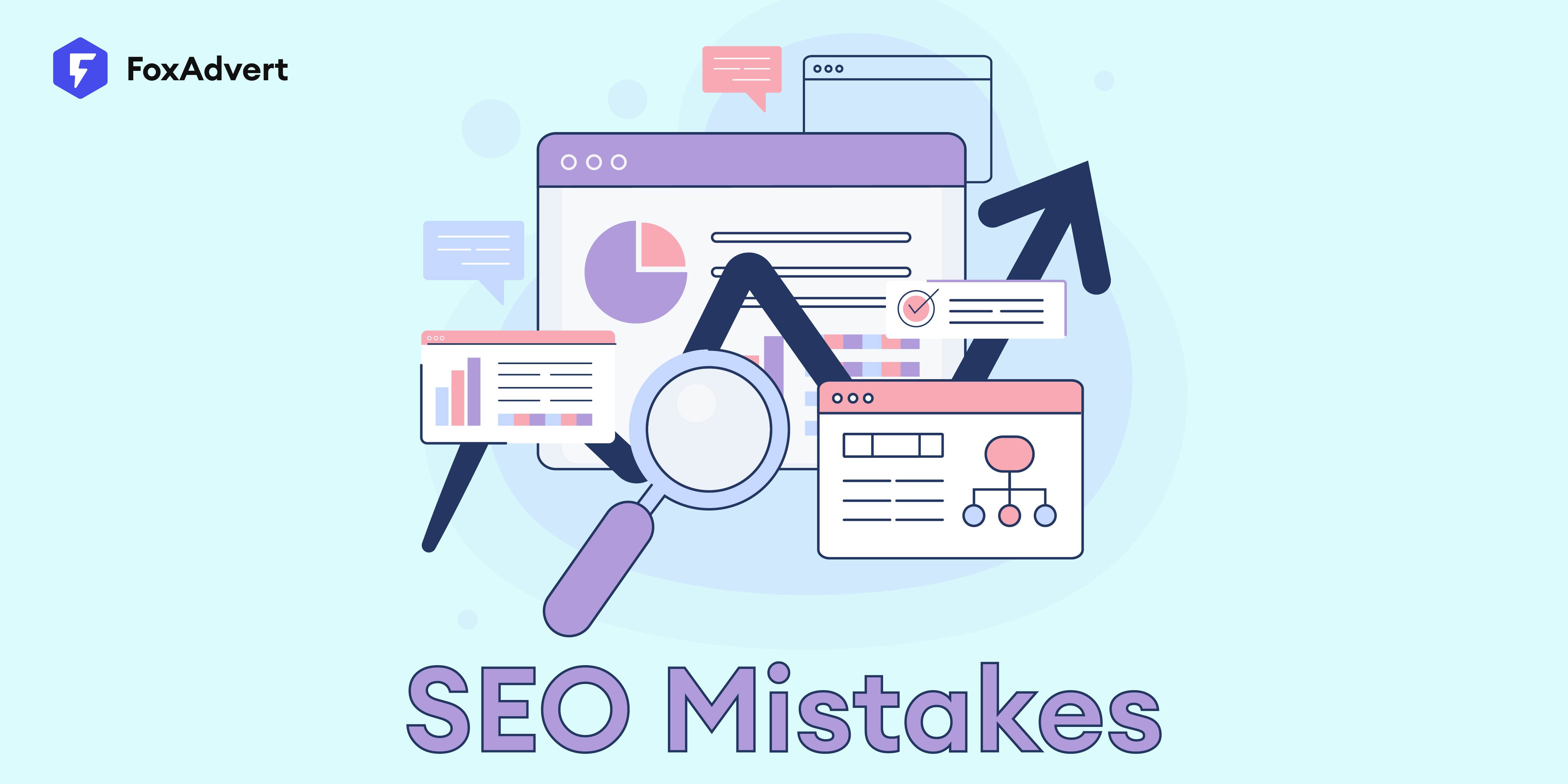
SEO is an intricate and constantly evolving discipline, which can make it tough to stay updated with the latest trends and best practices. The digital landscape changes rapidly, and what works today may not work tomorrow. That's why it’s critical to recognize the most common SEO mistakes—those missteps that can trip up even seasoned marketers. In this article, we’ll highlight seven frequent SEO errors and how avoiding them can streamline your efforts and drive better results.
In such a dynamic field, staying informed about potential pitfalls is key. Neglecting crucial elements like mobile optimization, keyword overuse, and the creation of low-quality content can significantly undermine your SEO strategy. Likewise, ignoring the optimization of essential components such as page titles, meta descriptions, and backlinks can prevent your website from reaching its full potential.
To see real success, focus on creating a mobile-friendly site, using keywords effectively, crafting valuable content, optimizing your page elements, building strong backlinks, and regularly reviewing your SEO performance. By steering clear of these common mistakes and adopting best practices, you’ll significantly boost your SEO efforts and secure more sustainable outcomes.
Failing to clearly define your target audience can severely limit your ability to generate meaningful leads. Without a focused approach, you may find yourself reaching the wrong people, which results in wasted time, resources, and missed opportunities. A lack of audience clarity means that your marketing efforts will not resonate with those who are most likely to convert, leaving potential customers untapped. Therefore, it’s crucial to identify and define your target audience to ensure that your marketing messages are impactful and precisely tailored to meet their needs.
To define your target audience effectively, start by understanding their desires and pain points. This insight allows you to craft marketing materials that speak directly to their interests. For instance, if your business caters to cooking enthusiasts, creating content around recipes or cooking tips would naturally attract and engage those individuals. By aligning your marketing efforts with your audience's specific needs, you can build stronger connections and drive more qualified leads.
Another effective approach to audience definition is competitor analysis. Researching similar businesses in your industry can reveal the demographics most actively engaging with your competitors. With this data, you can refine your marketing strategy to better reach and serve these valuable customer groups.
One of the most frequent mistakes when launching a website is neglecting keyword research. Failing to do so not only hurts your search engine rankings but also means missing out on valuable opportunities to attract leads and drive sales. Keyword research is foundational for any digital marketing strategy, and it’s especially crucial for businesses looking to thrive in the online space.
Incorporating the right keywords across your website is essential for improving visibility and ranking. This includes optimizing title tags, page copy, and even the alt text for images. If your content isn’t aligned with the keywords your audience is searching for, you’re leaving traffic on the table and falling short of your SEO potential. Don’t overlook mobile optimization either—more and more users are browsing and shopping on mobile devices, so ensure your website is fully responsive to provide an optimal user experience across all platforms.
Fortunately, a wealth of tools is available to help you with keyword research. Google Keyword Planner and Google Trends are excellent starting points, while platforms like SEMrush offers deeper insights into keyword opportunities. Additionally, you can attend SEO workshops or collaborate with marketing consultants to further refine your keyword strategy. By dedicating time to keyword research, you’ll not only improve your site’s search rankings but also open the door to increased traffic, leads, and ultimately, higher sales.
One of the cornerstones of SEO is the optimization of your page titles and meta descriptions. These elements are the first things users see in search engine results pages (SERPs), so they need to be both compelling and precise. If you overlook this crucial step, you risk missing out on valuable organic traffic. Always ensure that your titles and meta descriptions are not only relevant but also include targeted keywords that align with your content. This will help boost your ranking in the search results. Additionally, adding a clear call-to-action (CTA) can entice users to click through to your site, driving more traffic to your pages.
Optimizing titles and meta descriptions can be tricky, especially if you're new to SEO. That's where an experienced consultant can make a difference. They can guide you in crafting titles and descriptions that capture attention while incorporating the right keywords. By doing so, you ensure that your site is easily discoverable by those searching for information related to your offerings. If your goal is to prompt action—whether it’s making a purchase or signing up for a newsletter—adding a CTA to your meta description is an effective strategy to increase user engagement.
In SEO, the ultimate goal is to enhance your visibility and attract more visitors from search engines. By mastering the art of title and meta description optimization, you can significantly improve your chances of ranking higher and capturing the attention of potential customers.
Keyword overstuffing is a harmful SEO practice that can significantly hinder your website’s performance. While it may seem like a good idea to pack your content with as many keywords as possible, search engines like Google prioritize high-quality, natural language. When you overload your content with keywords, it disrupts the flow of your writing, making it sound forced and spammy. This, in turn, can result in penalties, with search engines lowering your site's ranking and visibility.
The consequences of keyword overstuffing can be severe. Not only will you lose valuable traffic and potential leads, but it can also damage your relationship with users, who may find your content off-putting and irrelevant. To avoid this pitfall, use keywords strategically and sparingly. Focus on creating content that is both valuable and engaging, meeting the needs of your audience.
Crafting content that resonates with your target audience is key. By doing so, you’ll build trust and establish credibility, which will naturally lead to increased sales and long-term business success. The best way to improve your SEO and drive sustainable growth is by delivering high-quality, relevant content that both search engines and readers will appreciate.
Image optimization plays a crucial role in enhancing your website’s SEO performance. Beyond simply improving the visual appeal of your site, well-optimized images can also boost traffic from image search results, increasing your overall visibility.
A common mistake many make is neglecting to use the correct file type. For example, if you're uploading a .jpg image, ensure the file name reflects this with the appropriate .jpg extension. This simple step helps search engines like Google properly index and display your images. Additionally, always include descriptive tags and captions with your images. This not only aids in improving search rankings but also makes it easier for potential customers to find your images.
Another critical aspect of image optimization is load time. Large or improperly optimized images can slow down your site, which directly impacts user experience. If an image takes too long to load, your visitors are more likely to leave before seeing your content. To keep your website running smoothly, ensure images are properly compressed and stored in efficient formats. This will help maintain fast load times, retain visitors, and enhance overall site performance.
One often overlooked but critical aspect of SEO is internal linking. Internal links serve two essential functions: they help search engines navigate and understand the structure of your website, and they guide users to relevant content, enhancing their overall experience. By neglecting internal links, you miss a valuable opportunity to improve both your site’s SEO performance and user engagement.
To avoid this mistake, ensure that internal links are integrated naturally within your content and site navigation. Focus on linking to relevant pages that will enhance the user’s journey and provide additional value. Additionally, consider using keyword-rich anchor text for these links, as it gives both search engines and users clear context about the linked content, further boosting your site's relevance.
Incorporating user-generated content can also amplify the impact of internal links. When visitors share your content on social media platforms, it can drive additional traffic and engagement, creating a broader network of relevant internal links. And remember, not all traffic is equal. Prioritize sources that drive organic search traffic, as they have a more significant impact on your SEO performance. Internal linking, when executed correctly, strengthens your site’s structure and SEO foundation, leading to better visibility and user retention.
A common yet significant SEO mistake is failing to monitor your website’s analytics. Without tracking your site's performance, you’re essentially flying blind—unable to discern what strategies are working and where improvements are needed. Monitoring your analytics gives you the insight to assess the effectiveness of your SEO efforts and adjust your strategies accordingly. This continuous feedback loop ensures that your efforts are optimized for success and that your website remains competitive in search rankings.
Analytics provide a wealth of data about your site’s performance, from organic traffic and user engagement to bounce rates and conversion rates. Without this critical information, you risk making decisions based on guesswork rather than informed data. Regularly tracking key metrics, such as backlinks, domain authority, and organic traffic, allows you to fine-tune your approach, spotting areas that need improvement and scaling what’s already working.
By consistently monitoring your SEO progress, you gain the clarity needed to stay agile and responsive to trends or issues as they arise. Utilize reliable analytics tools to keep a pulse on your site's health, enabling you to make proactive changes that drive better results and maintain long-term SEO success.

In the realm of online marketing, leveraging the right search engine tools is essential for success. However, relying too heavily on automated tools can cause you to overlook key opportunities, leading to stagnant rankings and reduced traffic. Furthermore, neglecting to monitor your SEO progress regularly means missing out on valuable insights that could enhance your strategy. Failing to address issues like negative SEO can also severely harm your business’s online reputation.
To maximize the value of automated search engine tools, follow these essential practices to ensure you're using them effectively:
1. Choose Quality SEO Tools: High-quality SEO tools are crucial for tracking your progress and optimizing your site for greater traffic. Prioritize tools that are reliable and provide accurate data to ensure you’re making decisions based on solid insights. While cheaper options may seem tempting, they often lack the depth and precision needed to drive meaningful results.
2. Monitor Progress Consistently: Once you’ve set up your tracking systems, it's vital to monitor them regularly. Checking in on your SEO performance helps you stay aligned with your goals and quickly adjust your strategy if needed. This proactive approach ensures that your website remains competitive and continues to perform well in search engine results pages (SERPs).
By integrating quality tools into your SEO process and staying vigilant in monitoring progress, you'll be able to optimize your efforts and achieve lasting success.
To steer clear of common SEO pitfalls, prioritize creating high-quality content, implementing effective internal linking, and optimizing your website for mobile devices. Moreover, define your target audience early on and conduct thorough keyword research before launching your site. By adhering to these guidelines, you can significantly enhance the effectiveness and efficiency of your SEO strategy.
For businesses looking to take their digital marketing to the next level, FoxAdvert offers data-driven solutions tailored to your needs. From advanced SEO strategies to app marketing and paid social advertising, we provide the tools and expertise to help you thrive in a competitive landscape.
Let FoxAdvert power your success—reach out today and transform your SEO game.